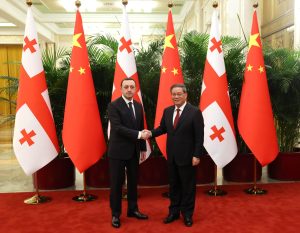When Georgia joined China’s Belt and Road Initiative (BRI) in 2015, the goal was simple: build roads, ports, and logistics networks. It was all about physical infrastructure. But that focus has shifted. The digital BRI partnership now includes digital innovation, green energy, trade, and culture. Georgia is no longer just building bridges—it’s connecting ideas. China, in turn, is expanding its influence not just with concrete, but with soft power and tech-driven collaboration. Explore the 2025 expansion of this evolving relationship.
By 2025, Georgia has become more than a transport hub between Europe and Asia. It’s now a digital and green connector. Recent deals highlight this change—smart cities, renewable energy, international trade fairs, and cultural exchange programs are now front and center. This evolving relationship signals a broader shift in global development. For procurement leaders like Mattias Knutsson, it’s a glimpse into the future of smarter, more sustainable cross-border partnerships.
Digital Innovation: Georgia’s Smart Turn
Georgia’s leap into digital cooperation with China is not a random act of modernization—it’s a calculated strategy to create a resilient, service-based economy supported by smart infrastructure.
Smart City Development
One of the most visible projects is the smart city initiative in Tbilisi. Spearheaded by Alibaba Cloud in partnership with Georgia’s Ministry of Economy, this pilot includes the deployment of AI-powered traffic systems, energy-efficient lighting, water management sensors, and centralized municipal data platforms. With an initial funding package of $60 million, it is projected to cut urban energy use by 20% and save the city $5 million annually.
E-Governance and Citizen Services
China and Georgia also signed agreements to expand digital governance tools. Citizens can now access licensing, business registration, medical appointments, and tax filing services through cloud-based apps developed under joint ventures. The goal is to reduce bureaucratic delays and improve transparency in public administration.
Cybersecurity & Digital Sovereignty
In March 2025, Georgia’s Information Security Service signed a framework agreement with China’s Cyberspace Administration to develop best practices for critical infrastructure protection. Also, this includes cybersecurity protocols for national grid systems, airport control centers, and government databases.
Data Infrastructure & Connectivity
Huawei announced the construction of a $95 million Tier III data center on the outskirts of Tbilisi, aimed at hosting cloud services, regional AI data, and emergency backup systems for Georgian ministries. It is expected to be fully operational by Q3 2026 and will employ up to 350 local engineers.
Environmental Collaboration: Greening the Partnership
As Georgia faces the dual challenge of climate change and energy transition, China has stepped in with project financing and technology transfer to support environmental initiatives.
Renewable Energy & Grid Modernization
In 2024, Georgia and China signed the Chongqing–Tbilisi Solar Agreement, launching the construction of a 250 MW solar farm in Kvemo Kartli. Moreover, this single plant will account for 5% of the country’s electricity supply by 2026 and offset 290,000 tons of carbon emissions annually.
Public Transit Overhaul
Through a partnership with BYD, Georgia has begun replacing its aging bus fleet. A total of 500 electric buses will be deployed in Tbilisi and Kutaisi by early 2026. With this, Georgia aims to reduce transport-based CO2 emissions by 25,000 tons per year.
Wastewater and River Purification
China Environmental Engineering Group, under a 30-year concession, is revamping Tbilisi’s main wastewater treatment facility. Using membrane bioreactor (MBR) tech, the system is expected to process 150 million cubic meters of water annually. It also cuts pollutants in the Kura River by 80%.
Green Chemical Refits
Old Soviet-era fertilizer and chemical plants are also being modernizing under EPC contracts signed in 2023. Over $150 million has been committed to upgrading sulfuric acid recovery units, phosphate processing, and water treatment systems in Rustavi and Zestafoni.
Expanding Cultural and Trade Ties
Beyond economics and infrastructure, Georgia and China are expanding human and cultural connectivity.
Trade Fairs and Investment Forums
The first Georgia–China Trade and Technology Fair, held in Tbilisi in 2024, drew over 300 Chinese and Georgian companies. Deals were signing in agri-tech, AI services, wine exports, and e-commerce integration. The 2025 edition is expected to double in size and introduce blockchain-based export tracking.
Cultural Exchange & Soft Power
Mandarin language centers, Chinese New Year festivals, and film screenings have found enthusiastic Georgian audiences. The Chinese Cultural Center in Tbilisi now runs year-round exhibitions, language classes, and a shared research library on Eurasian trade.
Education & Youth Diplomacy
Joint scholarship programs between Georgian Technical University and six Chinese polytechnics have supported over 200 STEM students in 2024 alone. Also, a new satellite campus of Beijing Polytechnic Institute is being constructed in Batumi.
Strategic Importance: Digital BRI with a Local Flavor
Georgia’s geography places it at the crossroads of Europe and Asia. Its importance in the BRI comes not just from its physical location, but from its political stability, market openness, and increasingly sophisticated digital governance.
Rather than simply importing Chinese infrastructure models, Georgia has tailored BRI cooperation to its own development goals. This includes:
- Emphasizing clean, sustainable growth
- Prioritizing tech infrastructure alongside traditional logistics
- Balancing East-West partnerships by keeping dialogue open with the EU and U.S.
This multifaceted approach ensures Georgia isn’t dependent on any one foreign partner and instead positions itself as a regional innovation and logistics hub.
Mattias Knutsson: Strategic Procurement in Action
Mattias Knutsson, a leader in global procurement and business development, views Georgia’s expanded BRI ties as a model for strategic engagement:
“Georgia has made the BRI its own by focusing on digital and environmental resilience. For procurement professionals, it’s a masterclass in building layered value: immediate infrastructure, long-term sustainability, and human capital development.”
He emphasizes the importance of including ESG clauses, local capacity-building KPIs, and joint technology transfers in modern procurement contracts:
“You don’t just buy infrastructure; you buy trust, impact, and future-proofing.”
Conclusion
Georgia’s evolving collaboration with China under the BRI framework is not only transforming the country’s economic landscape, but also redefining the BRI’s potential. No longer just about transit corridors and seaports, this partnership now embraces cloud computing, environmental sustainability, and cross-cultural exchange.
Georgia’s willingness to co-design projects, safeguard its data sovereignty, and maintain transparency in governance sets a high bar for other emerging economies. With careful planning, multi-sector coordination, and public-private alignment, Georgia is showing how smaller nations can shape global initiatives to fit local needs.
For procurement leaders and policymakers worldwide, Georgia’s approach offers replicable lessons in resilience, relevance, and results. As Mattias Knutsson puts it, “The most successful projects today are those that integrate not just supply chains, but values, vision, and versatility.”





